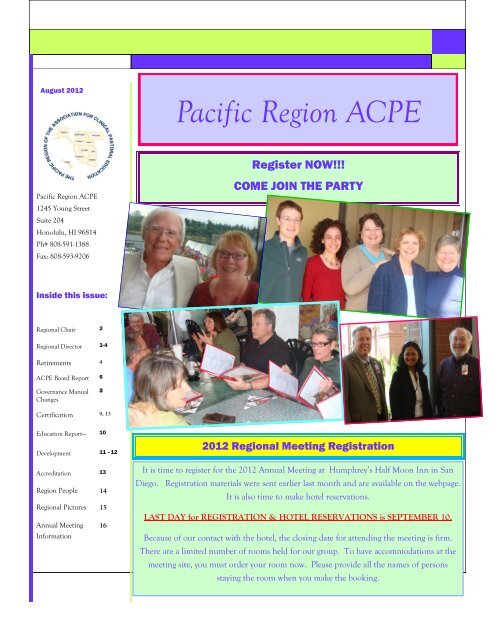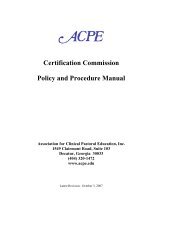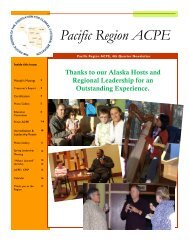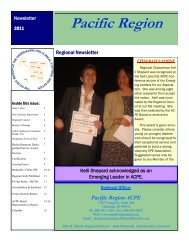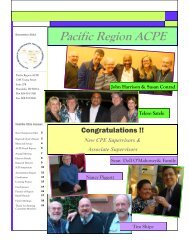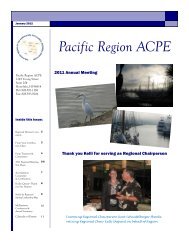Regional Newsletter - Pacific Region ACPE
Regional Newsletter - Pacific Region ACPE
Regional Newsletter - Pacific Region ACPE
You also want an ePaper? Increase the reach of your titles
YUMPU automatically turns print PDFs into web optimized ePapers that Google loves.
August 2012<br />
<strong>Pacific</strong> <strong>Region</strong> <strong>ACPE</strong><br />
1245 Young Street<br />
Suite 204<br />
Honolulu, HI 96814<br />
Ph# 808-591-1388<br />
Fax: 808-593-9206<br />
Inside this issue:<br />
<strong><strong>Region</strong>al</strong> Chair<br />
<strong><strong>Region</strong>al</strong> Director<br />
Retirements<br />
<strong>ACPE</strong> Board Report<br />
Governance Manual<br />
Changes<br />
Certification<br />
Education Report—<br />
Development<br />
Accreditation<br />
2<br />
3-4<br />
4<br />
6<br />
3<br />
9, 13<br />
10<br />
11 –12<br />
13<br />
<strong>Region</strong> People 14<br />
<strong><strong>Region</strong>al</strong> Pictures 15<br />
Annual Meeting<br />
Information<br />
16<br />
<strong>Pacific</strong> <strong>Region</strong> <strong>ACPE</strong><br />
Register NOW!!!<br />
COME JOIN THE PARTY<br />
2012 <strong><strong>Region</strong>al</strong> Meeting Registration<br />
It is time to register for the 2012 Annual Meeting at Humphrey’s Half Moon Inn in San<br />
Diego. Registration materials were sent earlier last month and are available on the webpage.<br />
It is also time to make hotel reservations.<br />
LAST DAY for REGISTRATION & HOTEL RESERVATIONS is SEPTEMBER 10.<br />
Because of our contact with the hotel, the closing date for attending the meeting is firm.<br />
There are a limited number of rooms held for our group. To have accommodations at the<br />
meeting site, you must order your room now. Please provide all the names of persons<br />
staying the room when you make the booking.
<strong>Pacific</strong> <strong>Region</strong> <strong>ACPE</strong><br />
Page 2<br />
Kent Schaufelberger<br />
<strong><strong>Region</strong>al</strong> Chairperson<br />
The summer is often a time when things get somewhat “put on hold,” to some extent or anoth-<br />
er. Not so with the <strong>Pacific</strong> <strong>Region</strong>. We are in busy with preparations for our Annual Meeting<br />
in October and there our Committees and task groups are busy readying for their assigned<br />
responsibilities. I’d like to highlight a few important elements that will be important for our<br />
time together as a <strong>Region</strong>.<br />
The first is our Governance change. You recently were sent, by email, a letter and revised<br />
Governance Manual, for your information—that met the requirement of a 60 day advance<br />
notice. Among some smaller changes is the most important. A task group, chaired by Karen<br />
Schnell, brought to the <strong><strong>Region</strong>al</strong> Council a proposal that we limit the term of the Chair to a total of four years ra-<br />
ther than six. My letter to you in the email sets out the rationale. I refer you to it for more specifics. While this<br />
may seem rather pedestrian, the point I would like to leave with any of you who have considered nomination to the<br />
office of Chair of the region, that this gives you an opportunity. I would encourage you to bring your name forth in<br />
the nominating convention that will take place during this meeting. Secondly, my term as chair elect and chair have<br />
been a blessing—I have learned about our region from a unique persective and gotten to know our <strong>Region</strong> and un-<br />
derstand our regional and national “debate” from a totally different perspective. As these next months fly by, I urge<br />
you to consider putting your name into nomination.<br />
The second event of our proposed annual meeting schedule is a report from the Learning Network. They have, lead<br />
by Stina Miller, have produced a draft “Core Curriculum” that I believe will help our programs and lead us into the<br />
future—that are wide enough for the diverse contexts in which we provide CPE in our <strong>Region</strong>. They are based origi-<br />
nally on the Common Standards (Competencies) for Chaplaincy established by the APC but are generalized so that<br />
any of our programs can design/adapt curriculum components to met each curricular element. I look forward to<br />
their presentation.<br />
Finally, our Development Committee is going to take us through a World Café experience. Their goals are to Iden-<br />
tifying potential student consumers of <strong>ACPE</strong> and their needs, generating strategic development ideas that could<br />
lead to creative program changes or innovative pilot projects, Developing criteria by which the Development Com-<br />
mittee could assess funding requests, Experimenting<br />
with a particular methodology of generating ideas and<br />
knowledge circulating in the corporate world, the World<br />
Café, to discover to what extent this methodology is use-<br />
ful for our region and organization<br />
I look forward to seeing you at the Annual Meeting.<br />
Blessing to you as you enjoy this summer and hopefully,<br />
some time of rest and relaxation.<br />
Kent Schaufelberger, <strong><strong>Region</strong>al</strong> Chair<br />
REGIONAL CHAIR<br />
<strong><strong>Region</strong>al</strong> Council at work.
<strong>Pacific</strong> <strong>Region</strong> <strong>ACPE</strong><br />
Page 3<br />
REGIONAL DIRECTOR REFLECTIONS<br />
Last November I had the privilege of visiting New Zealand for the first time. My best recommendation about the<br />
country is “don’t miss it”. If I was no longer able to live in one of the North American nations, New Zealand is one of<br />
the two countries in which I could find myself residing. The other is Australia.<br />
While New Zealand and Australia are different nations with unique cultures and histories,<br />
I found that what impressed me about one, impressed me about the other. Both have ancient<br />
cultures that have found a significant place in a modern nation. Both countries are<br />
young in spirit and remind me of America following WWII. Each country has a vitality,<br />
drive, and common spirit that move them together as a nation. The people are warm and<br />
inviting, and they have a hopeful, fearless attitude about the future. They believe strongly<br />
that working together and creating a social compact that embraces everyone is essential to<br />
the wellbeing of all.<br />
While we were in NZ, the US presidential debates where happening in the USA. I found<br />
it embarrassing each evening as I watched the 6:00 o’clock news to have commentators<br />
from another country laugh at our national antics. Their laugher was not so much a mocking<br />
of our politics. It was more a puzzlement as to what happened to America as the vanguard<br />
of thoughtful debate, fair play, support for those in need and civility in our public life. After I got over my embarrassment,<br />
I must say I found I had to laugh at that nonsense too.<br />
I’ve been reading Bill Moyers’ book of his speeches delivered over the last two decades called “Moyers on Democracy”.<br />
In that book he reports on a recent study that surveyed what Americans want in their society, viz. “… social cohesion<br />
and common ground based on pragmatism and compromise, patriotism and diversity.” He goes on to say, “But<br />
because of the great disparities in wealth the “shining city on the hill” has become a gated community whose privileged<br />
occupants, surrounded by moats of money and protected by a political system seduced with cash into subservience,<br />
are removed from the common life of the country.”<br />
While Moyers is talking about our social and political systems, he could just as easily be talking about our religious<br />
and educational communities. In a book called “Coming Apart”, the author outlines in endless detail sociological<br />
studies that show that not only is wealth being concentrated in the hands of a few, but so also is higher education, career<br />
opportunity and access to power.<br />
My visit to NZ and my recent reading have left me wondering about us as an organization – our attitudes and interests,<br />
our openness to diversity and sense of privilege. I would hate to think we might become the gated community Moyers<br />
says isolates and excludes. I wonder if we open our ears to hear the voices that speak to us or are we just listening to<br />
ourselves?<br />
I hope as we work with our Development and Education Committees to identify new areas of service and learning, we<br />
don’t fall into the trap of the gated community. Before looking at all options, I hope we don’t say, “The hospital<br />
doesn’t get anything out of it so they won’t pay for it.” I hope we don’t say, “That place is too remote; if those people<br />
want something, they can come to us.”
<strong><strong>Region</strong>al</strong> Director Reflections Continued ...<br />
That kind of thinking isolates us and disqualifies the great work we do. I hope rather we say with Moyers, “There’s<br />
no mistaking America (or <strong>ACPE</strong>) is ready for (or in need of) change…” As that change happens, we need to be out<br />
front leading, challenging, and moving people to a new awareness of a more expansive view of life and sense of common<br />
purpose. It is exciting for me to move around the <strong>Region</strong> and hear of the innovative programs and projects being<br />
planned. Those of you involved in them should deserve our kudos. That in part is how we lead.<br />
I would love to hear us use again the phrase “the spiritual care and education movement”. As a young Supervisor, it<br />
was a phrase that was used often. It told me I was part of something that was meaningful, forward looking and committed<br />
to a common purpose of learning and service. Somehow those New Zealanders energy for the common advancement<br />
of their people reminded me that phrase.<br />
Maybe, just maybe, we can live into that spirit again. Maybe, just maybe, the vitality and vision that grave us our<br />
work, our profession, our craft can spur us to see what’s needed in this new century. The prospect that we can do that<br />
is most exciting. Blessings to you all as we engage our work and move into the future.<br />
John Moody<br />
<strong><strong>Region</strong>al</strong> Director<br />
Retirements<br />
Three CPE Supervisors in Oregon retire in<br />
June and July. All three have served in many<br />
posts with their churches and at various CPE<br />
Centers. They all continue to live in Portland<br />
and Salem. All are or will be Emeritus CPE<br />
Supervisors.<br />
Page 4<br />
Fred Sickert, Horace Duke, Roy Tribe<br />
Well Done Good and Faithful Servants
Spiritual Care at Providence Portland<br />
Fr. Bruce Cwiekowski, Director Hoag Memorial Hospital, Newport Beach, CA<br />
CPE Supervisor Rev. Sandy Walker Dr. Donald Oliver, Director & Supervisor Evans<br />
Mulima will soon be a new CPE Center. They satellite with<br />
St. Joseph, Orange, CA where Oliver Lee is Supervisor.<br />
Oregon State Hospital, Salem, OR<br />
Around the <strong>Region</strong><br />
CPE Group with Supervisory Candidate<br />
Luz Berata-Borst. Supervisor Roy Tribe’s<br />
last group before retirement.<br />
Supervisor Brenda Simonds has established a satellite relationship<br />
St. Camillus Catholic Church and Fr. Chris Ponnet. The church<br />
serves in intercity Los Angeles. Rev. Rambhoru Brinkman is a Supervisory<br />
Candidate training is CPE supervision at St. Camillus.<br />
VA Puget Sound Health System, Seattle<br />
Supervisor Joe McMahan with Hospital CEO Dr.<br />
nd Advisory Committee Members Colleen and<br />
Chaplain Lamar Vincent.<br />
Page 5
<strong>Pacific</strong> <strong>Region</strong> <strong>ACPE</strong><br />
Page 6<br />
<strong>ACPE</strong> Board Report— Peter Clark & Earl Cooper<br />
During its two most recent conference calls in July and August, the <strong>ACPE</strong> Board discussed<br />
at length the governance proposal that was presented at the Arlington <strong>ACPE</strong>/<br />
REM meeting in February. It seemed clear to Board members that a consensus on<br />
restructuring the Board is still in flux and that there was much support for maintaining<br />
regional representation, but at the same time the Board needs to make itself leaner in<br />
order to be more fiscally responsible and more efficient.<br />
Toward that end, the Board approved a motion to maintain its current structure for<br />
the time being, but with two major changes: (1) that each region would elect one representative<br />
to the Board, rather than two (thus reducing the total size of the Board<br />
from 26 to 17); and that (2) all persons elected to the Board would be required to<br />
meet certain competencies and to fulfill the job description of Board members, which<br />
would be specified in documents that will be distributed soon. The approved motion<br />
would need to be ratified by the national membership, because it will mean a change<br />
to the <strong>ACPE</strong> by-laws (specifically Article 5).<br />
More information about this motion will be forthcoming from the <strong>ACPE</strong> President and<br />
national office.<br />
Thanks to Persons Completing Terms on National <strong>ACPE</strong> Commissions<br />
Thank you to all of you whose terms are ending for representing our<br />
<strong>Region</strong> on the national <strong>ACPE</strong> Board and its Commissions.<br />
<strong>ACPE</strong> Board of Directors — Peter Clark<br />
Certification Commission — Sandy Walker, Yvonne Valeris<br />
Ethics Commission — Wilma Reichard<br />
Standards Commission — Gordon Hilsman<br />
Some of these people may remain on the Commission for another term.
<strong>Pacific</strong> <strong>Region</strong> <strong>ACPE</strong><br />
Page 7<br />
Power is only<br />
important as<br />
an instru-<br />
ment for ser-<br />
vice to the<br />
powerless.<br />
Lech Walesa<br />
Human rights activist,<br />
Polish president, No-<br />
bel laureate (b. 1943)<br />
Thank you to everyone completing<br />
a term of service on the <strong><strong>Region</strong>al</strong><br />
Council or one of its Committees.<br />
<strong><strong>Region</strong>al</strong> Council — Mica Togami<br />
Charles Scalise<br />
Karen Schnell<br />
Peter Y. Clark<br />
Accreditation — Janet Hanson<br />
Adriana Cavina<br />
Bill Hawkins<br />
Certification — Yvonne Valeris<br />
Anita Lapeyre<br />
John Katonah<br />
Michael Hertz<br />
Development — Tom Harshman<br />
Peer Review — Julie Hanada<br />
RANC — Yuko Uesugi<br />
Doug Lubbers<br />
Some of these people may continue because they are eligible for another term.
GOVERNANCE MANUAL CHANGES<br />
Earlier this month, a draft of changes to the Governance Manual was sent to the Membership. The changes<br />
recommend moving the Chair-Elect/<strong>Region</strong> Chair position from a six year commitment to four years. When<br />
no one was interested in running for the position, several people were asked about their hesitancy. The demands<br />
of job, institution and family were most commonly named. It seemed daunting to think of committing<br />
oneself to six years in a post when everything seems to be day to day and month to month at this time. With<br />
that in mind, the <strong><strong>Region</strong>al</strong> Council voted to recommend a new four year configuration for the position that parallels<br />
the <strong>ACPE</strong> President office. The recommended model is as follows: Chairperson-Elect (one year), <strong><strong>Region</strong>al</strong><br />
Chairperson (two years) and finally Past Chairperson. Please review the recommendation to vote on the change<br />
at the Annual Meeting.<br />
<strong><strong>Region</strong>al</strong> Position Openings:<br />
Elections & Nominations<br />
<strong><strong>Region</strong>al</strong> Chairperson Elect, Secretary, <strong><strong>Region</strong>al</strong> Council and all committees.<br />
National Commission Openings:<br />
Standards, Professional Ethics, Certification.<br />
The above positions are available for election at the Annual Meeting in October. You can<br />
find the current leadership roster and the governance manual which includes information<br />
about the terms of each office and committee membership, eligibility to serve and election<br />
process on the region's website:<br />
www.pacificregionacpe.org.<br />
If you are interested in serving the region in a leadership or committee member role,<br />
please contact any of the RANC members listed below to share your interest by August 15,<br />
2012. Then, the RANC will compile this information and work with the committee chairs to<br />
develop a slate which will be presented for election by the general membership at the<br />
business meeting.<br />
For your information, the current RANC Members and our contact information<br />
are as follows:<br />
Doug Lubbers: Doug.Lubbers@chw.edu<br />
Vaughan Grant: vgrant@llu.edu<br />
Sean K. Doll O’Mahoney: seano3@u.washington.edu<br />
Yuko Uesugi: Yuesugi@mednet.ucla.edu<br />
If you have any questions about the election, please feel free to contact<br />
me.<br />
Thank you, Yuko Uesugi, Chair, RANC<br />
Page 8
<strong>Pacific</strong> <strong>Region</strong> <strong>ACPE</strong><br />
Page 9<br />
The <strong>Pacific</strong> <strong>Region</strong> has continues to have a thriving supervisory education process going throughout the entire<br />
region. At last tally there are 10 SES’s (Supervisory Education Students) – these are people who have had a Readiness<br />
Consultation and they have entered the certification track, however have not yet been certified by <strong>ACPE</strong> to conduct<br />
CPE units. That translates into them being more observers or co-supervising with their <strong>ACPE</strong> Supervisor. Because they<br />
have not been certified by <strong>ACPE</strong> they cannot supervise individuals or groups without the presence of their <strong>ACPE</strong> Su-<br />
pervisor.<br />
Currently we have 20 people who have been certified Candidate. This means<br />
they have met with a Certification Committee and they have been deemed to have<br />
pastoral competence, they are able to articulate conceptually about their experiences<br />
as care givers, and they are perceived by the committee to have potential as an <strong>ACPE</strong><br />
Supervisor. These 20 people span the gamut of experience in learning the art of super-<br />
vision. Some have just begun. Others have been at it for a while and are working hard<br />
on getting their theory papers passed. While others have completed their theory pa-<br />
pers and are now intentionally thinking about presenting themselves to the Certifica-<br />
tion Commission for certification as an Associate.<br />
Finally, we have 12 people who have been certified as Associate Supervisor.<br />
They too span the gamut of experience. There are the newly certified Association Su-<br />
pervisors who are delighting in their new found independence. There is the group of<br />
Associate Supervisors who have been supervising for a while and know that someday soon they will be sending in their<br />
Letter of Intent in order to take that last step of certification – <strong>ACPE</strong> Supervisor. Then there are those who are prepar-<br />
ing their Letter of Intent to be mailed in by the deadline.<br />
Certification<br />
The <strong>Pacific</strong> <strong>Region</strong> has done very well at all levels of certification. Many who have met the committees have<br />
been certified. Our ranks of <strong>ACPE</strong> Supervisors has grown so that we have more than 70 <strong>ACPE</strong> Supervisors in our Re-<br />
gion. I know that because of a program that was instituted a couple of years ago. An important part of the journey of<br />
certification is writing the theory papers and then passing them! Each region in <strong>ACPE</strong> is asked to read papers from<br />
Candidates in other regions. We routinely are asked to read papers. I am delighted to report that the system of having<br />
6 <strong>ACPE</strong> Supervisors assigned to each month of the year has worked very well. I receive a request from <strong>ACPE</strong> that<br />
there are papers to be read. I contact supervisors and we create a team. I am very pleased at the willingness and support<br />
of our <strong>ACPE</strong> Supervisors in your region. A great big THANKS goes to all of you who have been readers.<br />
Rod Seeger, Chairperson<br />
The <strong>Pacific</strong> <strong>Region</strong> is also very fortunate to have begun and continued the SOS program at each of the spring<br />
and fall meetings of the region. I truly believe the experience that is provided by participation in SOS has aided our<br />
SES’s who present for certification to be successful. At all levels of certification our SES’s have been very successful.<br />
We have a right to feel proud of the infrastructure and opportunity we have provided Supervisors and their students<br />
to make successful forward progress in the certification enterprise. [CONTINUED — Page 13]
Page 10<br />
EDUCATION COMMITTEE — Learning Project Update<br />
At our last <strong>Pacific</strong> <strong>Region</strong> conference, the Learning Network presented work in progress:<br />
identifying core learning for Level I & Level II CPE students. We have been working with<br />
the feedback we received since that meeting and will be bringing the entire compiled<br />
draft to the upcoming <strong>Region</strong> conference this fall. The main subject areas in the document<br />
include self-awareness, delivery of care, respect for diversity, spiritual assessment,<br />
ethical practice, teamwork and collaboration, and care of staff. Theoretical foundations will be woven<br />
into each subject area.<br />
This project grew out of our desire to provide support both for supervisory students and for the larger<br />
number of CPE students who are at Level I or II. Underlying<br />
our effort has been the awareness that students learn most effectively<br />
when they are<br />
clear about expected<br />
outcomes, have opportunities<br />
to receive feedback,<br />
can participate in<br />
assessments that support<br />
their learning and<br />
when they have a notion<br />
of what they need to do to demonstrate their learning.<br />
Looking ahead, the Learning Network will continue to invite insights<br />
from colleagues and - will be exploring other ways to enhance<br />
educational efforts in the <strong>Region</strong>. We anticipate linking<br />
core learning with supporting resources--working Certification toward Committee development Report—Continued of user-friendly ways to use<br />
new media (including the <strong>Region</strong> website), as a means of offering resources that may not be available<br />
in individual centers. Such resources may include theoretical underpinnings for our work, materials<br />
that enhance students’ learning (e.g., books, films, creative ways to engage students), and people in<br />
our <strong>Region</strong> who have particular expertise that could be shared across geographical distances.<br />
Stay tuned for more to come. And we always welcome ideas and input.<br />
Stina Miller, Chairperson<br />
Learning Project Team and<br />
Consultants at work.
Scholarships Available to Attend REM Invitational Conference, February 6-9, 2013 in Atlanta, GA<br />
The Development Committee of the <strong>ACPE</strong> <strong>Pacific</strong> <strong>Region</strong> has three partial scholarships available to assist in<br />
covering the expenses of attending the Invitational Conference of the Racial Ethnic Multicultural Network<br />
(REM) of the <strong>ACPE</strong>. These scholarships are available to those who are engaged in Level I, Level II or supervisory<br />
education CPE, with a maximum grant award of $500 per recipient. Those interested will be asked to submit an<br />
application. Scholarships will be awarded based on an applicant’s desire and moti-<br />
vation to attend REM, how attending REM will benefit his or her CPE process,<br />
and a willingness to share what he or she has learned by participating in REM. We<br />
ask that scholarship recipients be willing to write a reflection about their experience<br />
at REM for the regional <strong>ACPE</strong> newsletter.<br />
To apply for a scholarship to REM, please contact:<br />
Susan Conrad<br />
Chair, <strong>ACPE</strong> <strong>Pacific</strong> <strong>Region</strong> Development Committee<br />
Development Committee Report<br />
Most people are mirrors, reflecting the moods<br />
and emotions of the times; few are windows,<br />
bringing light to bear on the dark corners<br />
where troubles fester. The whole purpose of<br />
education is to turn mirrors into windows.<br />
Sydney J. Harris, journalist and author (1917-1986)<br />
Susan Conrad<br />
Chair<br />
Page 11
A Letter to the <strong>Region</strong><br />
July 5, 2012<br />
<strong>ACPE</strong> <strong>Pacific</strong> Development <strong>Region</strong><br />
c/o Rev. Cheri Coleman, Methodist Hospital of Southern California<br />
RE: Racial, Ethnic, Multicultural Network 25 th Invitational<br />
Theme: Celebrating Our Past, Embracing the Present, Proclaiming the Future.<br />
Washington, D.C., February 8-11, 2012<br />
Thank you for your scholarship to attend the historic <strong>ACPE</strong>/REM 25 th Invitational in<br />
Washington, D.C., this last February. I am appreciative of the <strong>Pacific</strong> Development <strong>Region</strong>’s<br />
vision, support and encouragement.<br />
As I reflect on how the conference informed my view of multi-cultural, multi-faith and interfaith<br />
work of chaplains, the conference modeled how diverse cultures and religions<br />
could work together to create sacred spaces of ritual and tradition. I was moved by the inclusion<br />
of Native American, Latin American, Japanese, Filipino, African American, Jewish<br />
and Humanist traditions, etc., in the giving of gifts to the incoming President. That first<br />
evening I was given a gift of radical hospitality by the welcoming of many faith traditions<br />
on one stage, along with the coming together of <strong>ACPE</strong> and REM communities as one.<br />
This hospitality had an immediate impact on my view of care of souls.<br />
The workshop A Black Woman’s Journey of Interdependence: How African Spirituality<br />
and Womanist Theology Have Impacted My Intercultural Pastoral Care given by Dr.<br />
Carolyn Akua L. McCrary from the Interdenominational Theological Center was the first<br />
time I heard an African American woman’s voice of pastoral care. She spoke of the<br />
“hush harbors” where African Americans could speak freely. Her workshop affirmed my<br />
Womanist theology, intercultural values and competency. Dr. McCrary wove African<br />
spirituality and pastoral/spiritual care into a tapestry that I cherish. I was encouraged by<br />
her inviting me to write more and speak with my own voice. I left her workshop feeling<br />
empowered to embrace my cultural diversity. From my personal interaction with her, I<br />
felt strengthened and affirmed to continue my journey to become a board certified chaplain.<br />
In the future, having a forum where other scholarship recipients can get together to dialogue<br />
with potential mentors would enhance the experience. Also, giving a full scholarship<br />
instead of a partial scholarship would benefit the future recipients who have limited<br />
funds. I look forward to assisting the <strong>Pacific</strong> Development <strong>Region</strong> and becoming an active<br />
participant in REM on the regional level.<br />
Sincerely,<br />
Reverend Vera Alice Bagneris, M.Div.<br />
Page 12
Finally, there are two groups of people that I have been able to associate with as the<br />
chair of our regional committee. The one group is the fantastic dozen people who are on<br />
the regional Certification Committee. Over and over again these 12 have given of their<br />
time, their expertise, their compassion, their values to work on sub-committees that are<br />
meeting with SES’s and their supervisors to discern if in fact this person is ready to supervise<br />
students. I count myself to be very fortunate to be the chair of this committee. The second<br />
group is the <strong>ACPE</strong> Certification Commission. Three people from each of the nine<br />
regions are sent to serve on the Commission. Sandy Walker, Yvonne Valeris and I have<br />
been the three representatives for <strong>Pacific</strong> <strong>Region</strong>. In the context of the Commission we<br />
meet people from all over the United States and together we determine who the future supervisors<br />
of <strong>ACPE</strong> will be. This is an awesome responsibility and experience. It feels much<br />
like what I imagine Moses felt when he encountered the burning bush not consumed. He<br />
was invited to take off his sandals for he was on sacred ground.<br />
Respectfully Submitted,<br />
Certification — Continued from Page 9.<br />
Rod Seeger, Chair<br />
<strong>Pacific</strong> <strong>Region</strong> Certification Committee<br />
ACCREDITATION<br />
Page 13<br />
A teacher<br />
is one<br />
who<br />
makes<br />
himself<br />
progres-<br />
sivelyun- necessary.<br />
Thomas<br />
Carruthers<br />
There are several reporting items that will help you be current and avoid notations.<br />
1) Any and all changes to your program or Center are to be reported on Appendix 2 in the Accredita<br />
tion Manual. This includes contracts, satellites, addition of faculty, name change of institutions, cer-<br />
tification of supervisory staff, and adding/deleting components.<br />
2) The Annual Center Report is due by January 15. It can be completed relatively quickly. The earlier it is<br />
sent, the better.<br />
3) The Annual <strong><strong>Region</strong>al</strong> Accreditation Fee is due in the first quarter of the year. An invoice will be sent<br />
from the <strong><strong>Region</strong>al</strong> Office in early January.<br />
4) If your Center has a 10 year review pending in 2013, remember that site visits should be scheduled so they<br />
occur before the end of October. It will be difficult to schedule site team visits after that date.<br />
Chairperson Beverly Hartz is available for consultation about any of these matters. She is al-<br />
so the person with whom Site Visits are scheduled. Contact information is on the webpage.
The Reverend Dr. Vernon M. Flesner<br />
Vern Flesner was raised on a dairy farm with four brothers in the South Eastern Nebraska.<br />
After college and seminary he was a pastor of a rural congregation for almost<br />
3 years.<br />
He did his Clinical Pastoral Education (CPE) at Texas Children Hospital, Houston,<br />
Texas and became the first chaplain hired for that institution. He established the<br />
CPE program at St. Luke's Hospital, Milwaukee, Wisconsin and was the Director for<br />
17 years.<br />
Vern then moved to the Washington Corrections Center, Shelton, Washington and<br />
was the Director of the CPE program for 6 ½ years. He was a campus pastor, program<br />
director at a retreat center and a part-time pastor interim before he developed<br />
and directed the CPE program at Providence St. Peter Hospital, Olympia, Washington.<br />
He assisted in developing the CPE program at the Good Samaritan Hospital,<br />
Puyallup, Washington in which he supervised 2 units. Madigan Army Medical Center<br />
at Fort Lewis, Washington contracted with him to continue their program as they<br />
were without a CPE supervisor for a year and half.<br />
Vern’s wife Dianna Cox make their home in Lakewood, WA and he has four grown<br />
sons and four grandchildren. Services were held in both Washington and Nebraska.<br />
Peer Review Report<br />
The Reverend Dr. LeRoy B. Futscher<br />
The Rev. Dr. LeRoy B. Futscher died July 8, 2012. He was 88 years old.<br />
Pastor Futscher was born in Minneapolis, Minnesota, and served a tour of military service in<br />
the Air Force prior to continuing his formal education.<br />
He received his B.A. from the University of Minnesota in 1948; graduated with a Master of Divinity<br />
in 1951 from Northwestern Lutheran Seminary; and was ordained August 3, 1952. He<br />
went on to receive a Master of Sacred Theology in Pastoral Counseling from Andover Newton<br />
Theological School in 1952; and a Doctor of Ministry from San Francisco Theological Seminary<br />
in 1977.<br />
He served as pastor of Holy Trinity-Marshall, St. Paul, Waterloo, Wisconsin; as Director of<br />
Chaplaincy Services, Lutheran Welfare Services of Northern California, Oakland, California;<br />
and Director of the Department of Religion and Health at Herrick Memorial Hospital, Berkeley.<br />
California. Recognized for his service in his community, Pastor Futscher was the longest<br />
serving member of the Berkeley Lions Club.<br />
LeRoy married his wife, Eleanor, on August 25, 1950 in Minneapolis, Minnesota and they had<br />
four children: Elizabeth, Deborah, Mark and Paul.<br />
Although recently hospitalized for an illness, LeRoy had just observed his 88th birthday and<br />
recently performed a wedding ceremony. Roy continued serving on the Professional Advisory<br />
Committee of Sutter Alta Bates CPE Center.<br />
Services were held in Oakland, California.<br />
We are<br />
thankful we<br />
knew and<br />
walked with<br />
our friends<br />
and<br />
colleagues.<br />
May the Great<br />
Spirit of Life<br />
and Love<br />
embrace them<br />
always.<br />
Information provided by<br />
the Families<br />
Page 14
“We gave you time off to ge to what<br />
meeting to do what?”<br />
Friends of the <strong>Region</strong><br />
Dr. Wilhelm (Willi) Polster from Erlanan, Germany<br />
& Dr. Si Khia from Yangon , Myanmar.<br />
Who knew a <strong><strong>Region</strong>al</strong> Business Meeting was so interesting.<br />
DO YOU KNOW THESE PEOPLE?!<br />
Page 15
Our Community in Action<br />
Page 16<br />
Keep Guessing — Maybe a Long Lost Relative or Two
2012 ANNUAL MEETING REGISTRATION<br />
It’s time to register for the<br />
Annual Meeting & SOS Consultation and book hotel rooms.<br />
Final Day is September 10 for both.<br />
Cut and Paste the Link below into your browser.<br />
It will take you directly to the<br />
Registration Information and Form.<br />
http://www.pacificregionacpe.org/documents/PR_Fall_2012_Registration.pdf<br />
Welcome to the <strong>Pacific</strong> <strong>Region</strong><br />
William (Bill) DeLong<br />
Legacy Emanuel Hospital, Portland, Oregon<br />
Thomas Phillips<br />
Portland Veterans Affairs Medical Center, Portland, Oregon<br />
Timothy (Tim) Thorstenson<br />
UCLA Medical Center, Santa Monica,,California<br />
Welcome to spiritual care and clinical education in the west. All of us in the <strong>Pacific</strong> <strong>Region</strong> share our<br />
prayers and intentions with you as you begin your ministry.<br />
May you find a home a professional home among us that is motivating, challenging and life giving.


